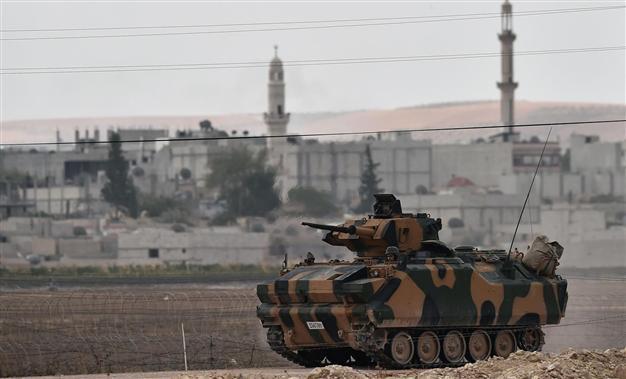Turkey’s Erdoğan, Russia’s Putin discuss ISIL threat
ANKARA

A Turkish armored vehicle patrols the border on Oct. 12 near Kobane. AFP Photo / Aris Messinis
Turkish President Recep Tayyip Erdoğan and his Russian counterpart Vladimir Putin discussed threats posed by jihadists from the Islamic State of Iraq and the Levant (ISIL), while Erdoğan also voiced his concerns over troubles faced by Crimean Tatars.Erdoğan initiated a telephone conversation with Putin late on Oct. 11, sources from his office told the state-run Anadolu Agency, noting the main motive of the phone call was extending condolences to the Russian head of state for the recent suicide bombing in Grozny.
Contact between Erdoğan and Putin came within days after Moscow warned Ankara that any plan to set up a buffer-zone in Syria, as Turkey has urged, would need to be approved by the United Nations Security Council.
“The discussion covered bilateral issues in view of the fifth High-Level Russian-Turkish Cooperation Council summit, to be held at the end of the year in Turkey. The two presidents spoke out for the further development of trade and economic ties between Russia and Turkey, including in agriculture and high technologies,” the Kremlin said in a statement. “The discussion of international affairs focused on the threat posed by the ISIL terrorist group,” the Kremlin added.
In Ankara, the same sources said Erdoğan underlined that “as a country that has fought against organizations such as the PKK [the outlawed Kurdistan Workers’ Party] and ISIL, Turkey is against all kinds of terror.”
Erdoğan, meanwhile, brought up the plight of Crimean Tatars and urged Putin to be receptive to the elimination of their concerns, the sources told Anadolu.
Last week, Turkish Undersecretary of the Foreign Ministry Feridun Sinirlioğlu and Russian Deputy Foreign Minister Mikhail Bogdanov met in the Turkish capital city of Ankara, where they discussed developments in Syria, Iraq, Palestine, Yemen and Libya.
The two Black Sea neighboring countries differ extremely in regard to their approach to the Syrian conflict. Turkey is keen for a regime change in Syria, while Russia remains one of the staunchest supporters of the Bashar al-Assad regime.
















